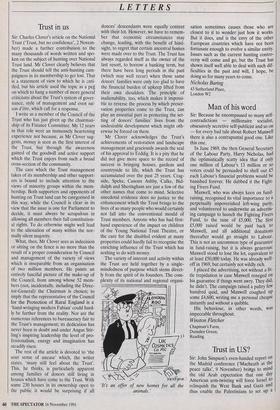LETTERS Trust in us
Sir: Charles Clover's article on the National Trust (`Trust, but no confidence', 2 Novem- ber) made a further contribution to the many thousands of words written and spo- ken on the subject of hunting over National Trust land. Mr Clover clearly believes that the Trust should tell the anti-hunting cam- paigners in its membership to get lost. That is a statement of view to which he is cnti- tled, but his article used the topic as a peg on which to hang a number of more general criticisms about the Trust's system of gover- nance, style of management and even rai- son d'être, which call for a response.
I write as a member of the Council of the Trust who has just given up the chairman- ship of its Finance Committee. My 12 years in that role were an immensely heartening experience not because, as Mr Clover sug- gests, money is seen as the first interest of the Trust, but through the awareness gained of the goodwill and active support which the Trust enjoys from such a broad cross-section of the community.
The care which the Trust management takes of its membership and other support- ers is bound to include attention to the views of minority groups within the mem- bership. Both supporters and opponents of hunting On Trust land can be categorised in this way; while the Council is clear in its view that the issue is one for Parliament to decide, it must always be scrupulous in allowing all members their full constitution- al rights. To do otherwise might well lead to the alienation of many within the nor- mally silent majority.
What, then, Mr Clover sees as indecision or sitting on the fence is no more than the result of a proper consideration by Council and management of the variety of views which is inseparable from an organisation of two million members. He paints an entirely fanciful picture of the make-up of the Council, from among whose 52 mem- bers (not, incidentally, including the Direc- tor-General) the Chairman is chosen; to imply that the representative of the Council for the Protection of Rural England is a 'hand-wringing modern Fabian' could hard- ly be further from the reality. Nor are the numerous references to bureaucracy fair to the Trust's management; its dedication has never been in doubt and under Angus Stir- ling's inspiring leadership the level of pro- fessionalism, energy and imagination has steadily risen.
The rest of the article is devoted to 'the sour sense of unease' which, the writer states, 'many still feel about the Trust'. This, he thinks, is particularly apparent among families of donors still living in houses which have come to the Trust. With some 230 houses• in its ownership open to the public it would be surprising if all donors' descendants were equally content with their lot. However, we have to remem- ber that economic circumstances may change, leading, with the benefit of hind- sight, to regret that certain ancestral homes were made over to the Trust. The Trust has always regarded itself as the owner of the last resort, to borrow a banking term, but there have been long periods in the past (which may well recur) when those same donors' families were only too glad to have the financial burden of upkeep lifted from their own shoulders. The principle of inalienability, too, which makes it impossi- ble to reverse the process by which preser- vation properties come to the Trust, can play an essential part in protecting the set- ting of donors' families' lives from the undesirable development which might oth- erwise be forced on them.
Mr Clover acknowledges the Trust's achievements of restoration and landscape management and graciously awards the seal of his approval to Erddig. It is a pity that he did not give more space to the record of success in bringing houses, gardens and countryside to life, which the Trust has accumulated over the past 25 years. Crag- side, Speke, Canons Ashby, fCalke, Bid- dulph and Sheringham are just a few of the other names that come to mind. Selective anecdotal evidence does no justice to the enhancement which the Trust brings to the lives of so many people who would certainly not fall into the conventional mould of Trust members. Anyone who has had first- hand experience of the impact on children of the Young National Trust Theatre, or the care for the disabled evident at many properties could hardly fail to recognise the enriching influence of the Trust which has nothing to do with money.
The variety of interest and activity within the Trust are held together by a single- mindedness of purpose which stems direct- ly from the spirit of its founders. The com- plexity of its national and regional organi- offer of new homes for all the animals.' sation sometimes causes those who are closest to it to wonder just how it works. But it does, and is the envy of the other European countries which have not been fortunate enough to evolve a similar entity. Issues such as the current hunting contro- versy will come and go, but the Trust has shown itself well able to deal with such dif- ficulties in the past and will, I hope, be doing so for many years to come.
Nicholas Baring
43 Sutherland Place, London W2










































































 Previous page
Previous page